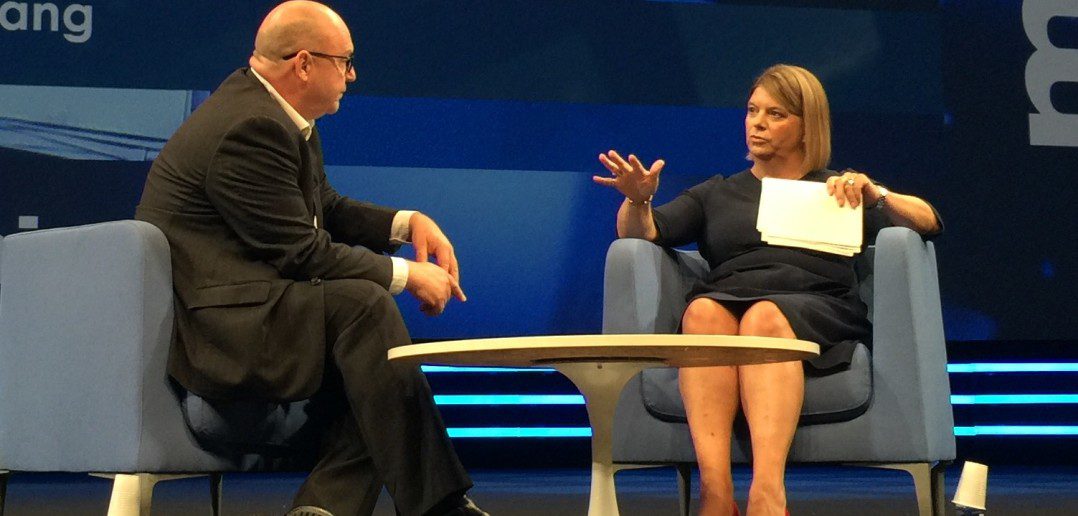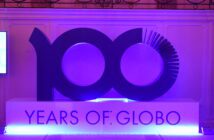Sophie Turner Laing is no stranger to MIPCOM, but her keynote this year was the first time she’s taken the Grand Audi stage since being appointed as chief executive of Endemol Shine Group.
There, she oversees a network of more than 120 companies in more than 30 markets, with a portfolio of around 600 revenue-generating scripted and non-scripted titles. So what next for the company created by the merger of Endemol, Shine Group and CORE Media Group earlier this year – and for its boss? Interviewer David Jenkinson of C21 Media was tasked with finding out, but only after her speech, which marked her 33rd year at the Cannes markets.
Turner Laing started her career working in children’s TV, on The Muppet Show. « Working in kids TV convinced me early on of the value of a full 360-degree approach, » she said. « Whatever the platform, whoever owned the pipe, kids’ producers saw their shows as brands before anyone else in TV did. »
She went on to talk about television’s importance as a mass medium, for communities to share stories and communicate ideas.
« It’s clear that creatively, the bar is very high. And though fragmented, overall TV viewership is holding up, with audiences watching an average of four hours a day in Europe, and more in North America. TV, it seems, has never been in better health, » said Turner Laing, before wondering why the industry often seems to be feeling down on its luck.
« I’ve heard the death of television predicted too many times from stages such as this one… Somehow we always manage to feel under threat, » she said. « There is always a perceived new enemy. I simply do not share that view… For us as an industry, and particularly for us as content creators, we have never had it so good. »
Turner Laing praised Netflix, Amazon and Hulu for providing new opportunities for talent and new windows in the distribution chain, as well as new opportunities for viewers to watch their favourite shows.
She criticised the distinctions between the worlds of « TV folk, film folk, digital natives », noting that her emotional response to something brilliant is the same whether she’s in a cinema, watching TV or using her iPad.
But she did question whether social media can ever trump TV for entertainment. « By itself, social media doesn’t get close to the bond between a programme and a viewer who’s settled down on a sofa after a long day at the office, » she said.
How does the industry navigate the new world of opportunity? « In today’s world, producers and content owners need to think more broadly: we need to focus on building a direct relationship with our customers: the audiences, » she said, calling for even more of a focus on programmes as brands.
« The power of brands has never been more important to help cut through the clutter and command attention, » said Turner Laing. « The duty of the IP owner is to strategically manage the growth and development of these programme brands. »
She talked about Michelle Phan, whose YouTube channel has reached 1 billion views, as a creator as important to Endemol Shine as the traditional TV talent that Endemol Shine works with. It’s partnered with her on the ICON online video network. And that extends to Endemol Shine’s latest deal with DreamWorks-owned multi-channel network AwesomenessTV, which has just been announced.
« In the old days, you owned something or competed with it. But collaboration is the new world order, » said Turner Laing. « I find that incredibly exciting. These are the types of partnerships we want to form at Endemol Shine, working with new creators who have come from different media or disciplines… I believe that it is through partnership that we will all move forward. »
Turner Laing said that geographical diversity is hugely important to Endemol Shine. « I’m sure there will be some of you in the room who view consolidation and the growth of the so-called mega-indies as a worrying trend, » she said. « There is also the rather isolationist argument from some that foreign investment leads to a loss of cultural identity. » She disagreed with both points of view, unsurprisingly.
« Where scale becomes meaningful and far more interesting is when it comes with collaboration and smart use of connections… It is variety that is our major strength. Diversity is the root of our substance as a truly creative business. »
Turner Laing finished off with an optimistic note on the future. « We are arguably entering into a world beyond channels. This is significant change, and that pace of change is only going to accelerate, » she said. « Maybe TV was a little late coming to the digital party, but let’s face it; it wouldn’t be a good party without us. »
As Jenkinson arrived onstage, the conversation turned to how the new, merged company works. « As soon as something starts bubbling up around the world, they get it round the system as quickly as possible. There’s no barrier of entry to any production company anywhere in the world picking it up and going to pitch it, » she said.
What would she be doing if she was running a channel now? « The pie is changing shape, definitely. Everybody talks about the death of the last media and the advantage of the next, but the film business is still running quite happily, » she said. « Putting my old channel hat on, you are always on the search for that distinctive programing that cuts through. That’s what you live and die for. »
Turner Laing talked digital. « We have now about maybe 5%of our revenues coming from what they euphemistically put in the budget line as ‘other’. Which is not sales to VOD because that comes under ‘telly’, » she said. But this 5% includes licensing and live events as well as digital initiatives. In two years time she’s hoping to make digital « a quarter of our revenues: I would be totally delighted if we can get it there ».




